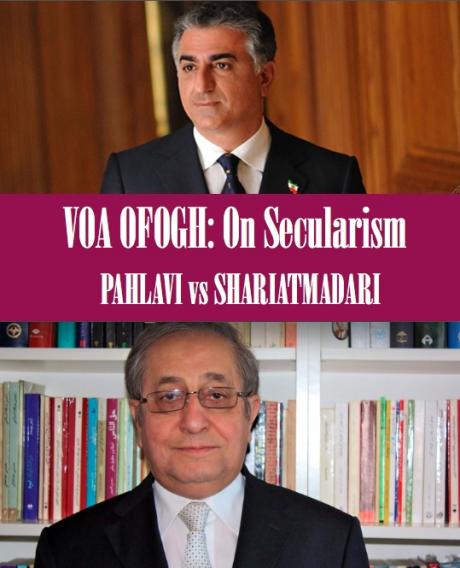
Siamak Dehganpour hosts VOA talk show with a debate between Crown Prince Reza Pahlavi and Hassan Shariatmadari
About Hassan Shariatmadari:
Hassan Shariatmadari is an Iranian opposition politician and a leading proponent of the Free Elections Movement (Jonbeshe Entekhabate Azad) in Iran. He is the son of Grand Ayatollah Seyyed Kazem Shariatmadari (one of the most powerful Shia clerics of Iran in the 1960s and 70s). [1] During the Pahlavi regime, he supported his father’s position that the Shah’s authority should be limited to what had been specified in the Constitutional revolution of 1906, and that a democratic parliament should be in charge of running the country instead of the monarchy taking an active role in ruling Iran. Between 1973-1980 he served as the Chief Editor of Payame Shadi and Nalse Now monthly magazines for children and youth.
At the time of the Iranian revolution of 1979, Shariatmadari co-founded the Iranian People’s Republican Party (IPRP). A firm believer in the separation of religion and politics, his movement resisted the establishment of the Velayat-e faqih(Rule of the Jurist) system in Iran and was violently crushed by the Iranian revolutionary guard and the Basij in 1980 after which he went into exile. At its height, IPRP was able to mobilize more than a million people in the Azarbayjanprovince of Iran to protest against Khomeini’s rule.
In 1983, Shariatmadari joined forces with several nationalist and center leftist groups to form the National Republicans of Iran, a coalition aimed at uniting a broad range of secular forces under a common political umbrella organization. In 2004, he joined other secular political leaders of the opposition in the formation of United Republicans for Iran (URI) (Etehadieh Jomhoori khahan), once the largest coalition of Iranian opposition groups after the revolution. The URI envisioned Iran as a democratic republic with constitutional guarantees of civil, political, social rights and individual liberties, separation of religion and state, sustainable social development, gender equality, rights of minorities, and increased local decision-making authority, and supported a non-violent struggle path towards democracy.
Shariatmadari holds two Master’s degrees, one in Physics from Aryamehr University of Technology (currently Sharif University of Technology) and one in Law from Tehran University. In parallel to his university studies, he studied theology and philosophy at the Qom Shia Seminary, and is intimately familiar with Islamic jurisprudence.
About Reza Pahlavi Crown Prince of Iran :
Reza Pahlavi was born in Tehran, Iran on October 31, 1960 to the late Shah of Iran and Empress Farah Pahlavi. As Crown Prince of Iran and the oldest of four siblings, he left Iran at the age of 17 for air force training, during which time the establishment of the clerical regime in Iran prevented his return to his homeland. Despite being forced to live in exile, Reza Pahlavi’s commitment and patriotic duty to Iran endures.
After leaving Iran, Reza Pahlavi completed his higher education with a degree in political science from the University of Southern California. An accomplished jet fighter pilot, Reza Pahlavi completed the United States Air Force Training Program at the Reese Air Force Base in Lubbock, Texas. During the Iran-Iraq War, Reza Pahlavi volunteered to serve his country’s military as a fighter pilot, but was declined by the clerical regime.
For over thirty years, Reza Pahlavi has been a leader and advocate of the principles of freedom, democracy and human rights for his countrymen. He maintains constant contact with his compatriots both inside and outside the country. Pahlavi travels the world meeting with heads of state, legislators, policy-makers, interest groups and student groups speaking about the plight of Iranians under the Islamic regime in Iran. He consistently speaks out against the widespread abuse and oppression of the Iranian people and calls for the establishment of a secular democracy in Iran. Since the fraudulent elections of 2009, Pahlavi’s singular message of solidarity and unity for a secular and democratic Iran has taken on a new air of urgency.
In addition to numerous articles, Reza Pahlavi has written three books, on the state of affairs in Iran: Gozashteh va Ayandeh (Kayhan Publishing, 2000); Winds of Change: The Future of Democracy in Iran (Regnery, 2002); and IRAN: L’Heure du Choix [IRAN: The Deciding Hour] (Denoël, 2009).
Reza Pahlavi has lived in exile since 1978. He married Yasmine Etemad-Amini on June 12, 1986. They have three daughters: Noor Pahlavi (born April 3, 1992), Iman Pahlavi (born September 12, 1993), and Farah Pahlavi (born January 17, 2004).
Yasmine is a graduate of The George Washington University School of Law with a Doctorate in Juries Prudence. She was admitted to the Bar and practiced for ten years as a lawyer, for the Children’s Law Center, as a legal advocate for at-risk youth. Yasmine also founded the Foundation for the Children of Iran (FCI) in 1991. FCI, a non-profit foundation, provides complex, life saving, free health care services to indigent Iranian children.
Reza Pahlavi’s siblings include his sister Farahnaz Pahlavi (March 12, 1963), brother Ali-Reza Pahlavi (April 28, 1966-January 4, 2011), and sister Leila Pahlavi (March 27, 1970 – June 10, 2001), as well as half-sister, Shahnaz Pahlavi (October 27, 1940).
Related Blog:
VOA OFOGH: Washington Gathering of ‘Opposition’ Think Tank
VOA OFOGH: Mehdi Nourbaksh responds to SAVAK director Parviz Sabeti’s Claims
VOA’s OFOGH: Abbas Milani and Mansour Borji on Fate of Iran’s Christians
VOA OFOGH: Crown Prince Reza and the State of the Opposition Abroad
VOA’s OFOGH: Abbas Milani & Majid Tafreshi On Iran’s Demands For WW2 Reparations
VOA’s OFOGH: Abbas Milani & Mansour Farhang on IRI “Plot” on Saudi Prince






